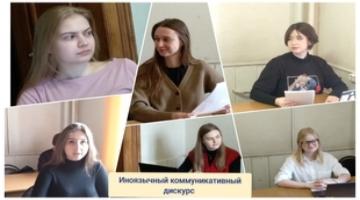4 - 7 марта 2024 г. в РГГУ прошли заседания студенческого научного семинара «Иноязычный коммуникативный дискурс».
В декабрьских заседаниях семинара принимали участие студенты факультета международных отношений, политологии и зарубежного регионоведения групп канд. пед. наук, доцента Татьяны Барановой и старшего преподавателя Елены Гурьяновой по направлению подготовки «Международные отношения», направленность «Ближневосточные исследования» (3 курс).
Основной задачей семинара является развитие у студентов навыков участия в индивидуальных и коллективных учебно-научных исследованиях, формирование представления о теории и практике научного дискурса; пробуждение интереса студентов к научному исследованию; стимулирование самообразования студентов; формирование форм научной коммуникации.
Участники семинара продолжили разрабатывать выбранную ими научную тематику, сферой интересов студентов стали проблемы, находящиеся на стыке таких наук, как лингвистика, политология, психология, педагогика, история, также прошло обсуждение политического и новостного дискурса. Были представлены выступления на следующие темы:
- Russian-Turkish trade and economic relations: current state and future prospects
Despite the challenging periods of historical confrontation in bilateral relations, today Turkey is seen as one of Russia's main trading partners. When coming to mutual cooperation, both countries rely on their wide experience of interaction within the field of economy and trade, combined with foreign policy interests, thereby pushing each other to find a balance in subjects of mutual concern.
In general, Russian-Turkish relations are described as ones that combine elements of fragility and flexibility. In this interpretation, fragility is a reference to a historical plot, and flexibility, in its turn, refers to pragmatism – even large cultural differences between countries do not interfere with building dialogue and do not allow relations to break down under the influence of another crisis. The main interests within the framework of bilateral cooperation happen to be the spheres of tourism, energy, and, of course, trade and economic relations.
- Makarenko’s system of perspective lines
The true stimulus of human life is the joy of tomorrow. In pedagogical technique, this delight of tomorrow is one of the most fundamental objects of work. First, we must organize the pleasure itself and make it a reality. Secondly, it is necessary to persistently transform the simpler kinds of happiness into more complex and humanly significant ones. That is the main point: from the simplest primitive satisfaction to the deepest sense of duty.
- Some communicative techniques of neuro-linguistic programming
It is also important to mention the technique of anchoring. Anchoring is the process by which certain stimulus become associated with specific responses and thus trigger them. The concept of anchoring in NLP originates from Pavlov's "stimulus-response". In other words, an anchor is the connection between a stimulus and a state into which a person enters when confronted with that stimulus.
Anchors are divided into different types:
- Visual (e.g., a gesture, an object of a specific color, interior elements);
- Auditory (voice intonations, melody);
- Kinaesthetic (touch, smell); Discrete (words, numbers).
The purpose of working with anchors is to fix any desired experience and then reproduce it at the necessary moment. For example, you can do it with your own mind: every time you use a filler word, pinch your hand. The use of fillers such as "um," "like," or "you know" will become associated with unpleasant sensations, and the brain will cease to produce them automatically.
- The importance of Ben-Gurion personality for Israel’s history
Ben-Gurion's whole life was subordinated to the idea of the revival of the Jewish state in the homeland of his ancestors. He created a government, fought for the recognition of Israel, resigned and returned to big politics again. The cherished dream of Ben–Gurion came true in 1948. It was in this year that Jewish national identity was revived after 1944 years. The State of Israel was created.
For many Israelis, the name of the founder of the Jewish state, David Ben-Gurion, is sacred. Believers compare him with the heroic personalities of the Old Testament. Such as the second king of Israel, David; the leader of the Jewish people, the successor of Moses, Joshua; the fighter against pagan idolatry, Judas Maccabee. Some modern politicians put him on a row with Churchill, Roosevelt, de Gaulle… The international airport in Tel-Aviv, a street in Jerusalem and a university in the Negev are named in his honor.
- Linguistic aspects of intercultural communication.
The term "intercultural communication" was introduced into scientific circulation by E. Hall and G. Trager in 1954. Intercultural communication (ICC) is always interpersonal communication, in which the cultural background of the communicants is very important. It involves communication between people of different cultures, during which at least one of them can speak a non-native language. The need for verbal support of intercultural communication comes to the fore. Language, the main exponent of the identity of a culture, is the main mediator in the intercultural communication process.
Представленные темы вызвали большой интерес у участников семинара, прошло интересное обсуждение. Заявленные темы станут основой для дальнейшего научного исследования студентов. Семинар включен в официальный перечень научных мероприятий Р
ГГУ 2024 г.





